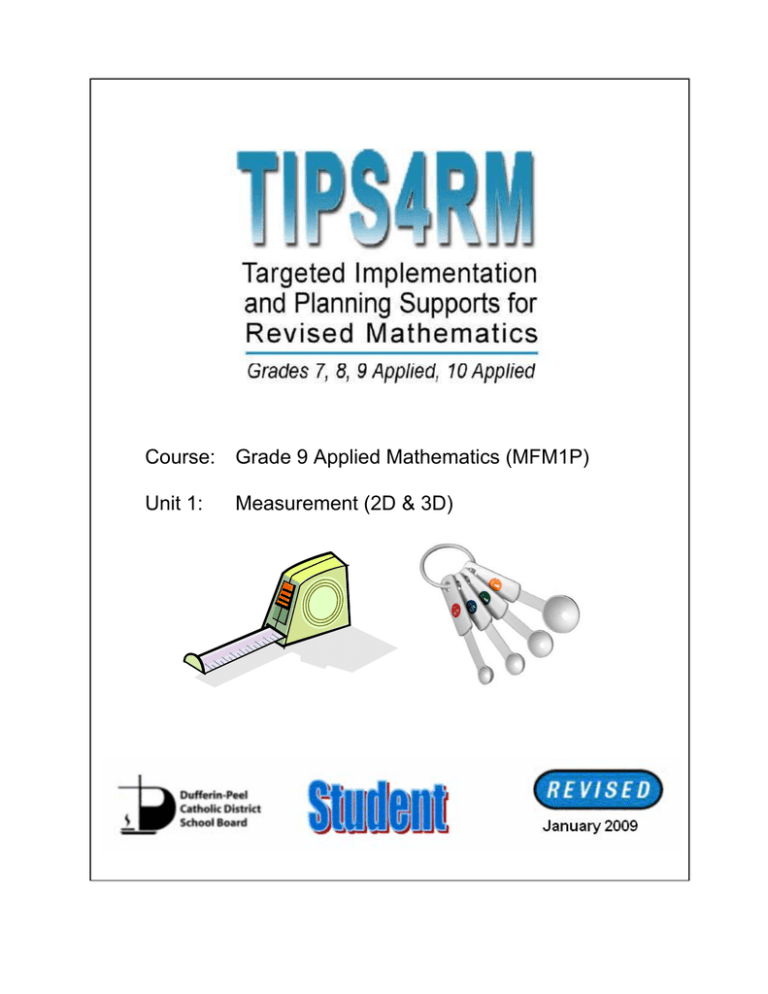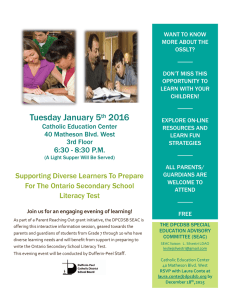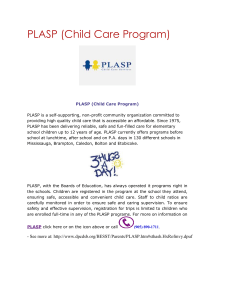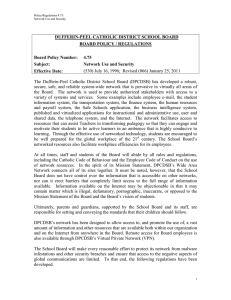Course: Grade 9 Applied Mathematics (MFM1P)
advertisement

Course: Grade 9 Applied Mathematics (MFM1P) Unit 1: Measurement (2D & 3D) Unit 1 Measurement (2D & 3D) Section 1.1.1 1.1.2 1.2.1 1.2.J 1.2.2 1.2.P 1.3.2 1.3.P 1.4.2 1.4.3 1.4.P 1.4.4 1.4.5 1.5.1 1.5.3 1.5.5 1.5.P 1.5.6 1.6.1 1.6.2 1.6.P 1.6.J 1.W 1.S 1.R 1.RLS Activity Investigation - Comparing Volumes Pair Share – Volume Melting Ice Cream Journal Activity Applications of Volume Practice Scale Drawing Details Practice Composite Figures Notes Exploring Composite Shapes Practice Use What You Know Frayer Model The Rope Stretchers Right or Not? The Pythagorean Theorem Notes Practice Pythagorean Theorem Puzzle Coach or Be Coached The Container! Practice Journal Activity Definition Page Unit Summary Page Reflecting on My Learning (3, 2, 1) Reflecting on Learning Skills Page 3 4 6 7 8 11 13 16 17 19 20 23 24 25 26 28 30 31 32 34 36 38 39 41 42 43 MFM 1P - Grade 9 Applied Mathematics – Unit 1: Measurement 2D & 3D (DPCDSB Dec 2008) 1-2 1.1.1: Investigation – Comparing Volumes Purpose Compare volumes of shapes that have the same base and height. Hypothesis I think that... 1. × _________ = 2. × _________ = 3. × _________ = Investigate How many times will the volume of the shape on the left fill the shape on the right? 1. Vcone × ___ = Vcylinder 2. Vsquare pyramid × _____ = Vsquare prism 3. Vtriangular pyramid × _____ = Vtriangular prism Conclusion MFM 1P - Grade 9 Applied Mathematics – Unit 1: Measurement 2D & 3D (DPCDSB Dec 2008) 1-3 1.1.2: Pair Share – Volume A – Prisms Circle the shapes that are prisms. Volume of a prism = area of __________ × __________. B – Pyramids Circle the shapes that are pyramids. Volume of a pyramid = volume of a prism ÷__________. MFM 1P - Grade 9 Applied Mathematics – Unit 1: Measurement 2D & 3D (DPCDSB Dec 2008) 1-4 1.1.2: Pair Share – Volume (continued) Calculate the volume of the following figures. Show your work. A Calculate the volume of the following figures. Show your work. A B 8 mm 15 mm 12 cm 5 cm MFM 1P - Grade 9 Applied Mathematics – Unit 1: Measurement 2D & 3D (DPCDSB Dec 2008) 1-5 1.2.1: Melting Ice Cream • • • • Heather purchased an ice cream cone. The scoop of ice cream was a sphere. The height of the cone equals the diameter of both the cone and the sphere. If the ice cream melts, how much will overflow the cone? In Pairs A. What do we already know? 1. = Volumecone ÷ _______ = Volume ______ ÷ _______ 2. Volumecylinder = (Area of Base) × ( ) 3. Volumecone = (Area of Base) × ( ) ÷ _____ B. Using the two 3-D relational solids of the cone and sphere, compare. 1. Heightcone and Heightsphere Comparison: 2. Radiuscone and Radiussphere Comparison: 3. Volumecone and Volumesphere Comparison: C. Conclusion _______ × = D. How much ice cream will overflow? Write a relationship statement. MFM 1P - Grade 9 Applied Mathematics – Unit 1: Measurement 2D & 3D (DPCDSB Dec 2008) 1-6 1.2.J: Journal Activity 1. Using words, pictures, numbers, and symbols, describe the relationships you discovered today. 2. Use the 3-D relational sets and record as many paired relationships as you can. For example, the small triangular prism is half the volume of the small squarebased prism. MFM 1P - Grade 9 Applied Mathematics – Unit 1: Measurement 2D & 3D (DPCDSB Dec 2008) 1-7 1.2.3: Applications of Volume 1. Calculate the volume of the perfume bottle. 5 cm 5 cm 15 cm 3 cm 8 cm 2. How much soup can this container hold? 7 cm 10 cm 3. Calculate the volume of the rectangular prism. 5 cm. 4 cm. 6 cm. MFM 1P - Grade 9 Applied Mathematics – Unit 1: Measurement 2D & 3D (DPCDSB Dec 2008) 1-8 1.2.3: Applications of Volume (continued) 4. Which popcorn container will hold more? 16 cm 8 cm 16 cm 15 cm 15 cm 5. How many times bigger is the second sphere? 5m MFM 1P - Grade 9 Applied Mathematics – Unit 1: Measurement 2D & 3D (DPCDSB Dec 2008) 15 m 1-9 1.2.3: Applications of Volume (continued) 6. How much more expensive should the large aquarium be than the small aquarium if the cost is based on the volume? 12 cm. 16 cm. 8 cm. 24 cm. 32 cm. 16 cm. 7. Determine the volume of the cabin. Show your work. 2m 3m 6m 6m MFM 1P - Grade 9 Applied Mathematics – Unit 1: Measurement 2D & 3D (DPCDSB Dec 2008) 1-10 1.2.P: Practice 1. Using the relationships you have discovered, calculate the volume of each of the following 3-D figures. (a) 4 mm 6 mm 14 mm 5mm (b) 3m 88 m m (c) 4m 2m MFM 1P - Grade 9 Applied Mathematics – Unit 1: Measurement 2D & 3D (DPCDSB Dec 2008) 1-11 1.2.P: Practice (continued) 2. A movie theatre wants to compare the volumes of popcorn in two containers, a cube with edge length 8.1 cm and a cylinder with radius 4.5 cm and height 8.0 cm. Which container holds more popcorn? Draw diagrams to support your solution. 3. An entertainment room is 10.5 m long by 7.5 m wide by 3.5 m high. If 5 m 3 of air is needed for each person, how many people can use the room at one time? MFM 1P - Grade 9 Applied Mathematics – Unit 1: Measurement 2D & 3D (DPCDSB Dec 2008) 1-12 1.3.2: Scale Drawing Details 1. Consider the two composite figures. (a) Identify the geometric shapes in each. Write the names on the diagrams. Figure 1 Figure 2 (b) Area For determining the area of the shaded regions, describe the features and calculations that are: i) the same ii) different (c) Which of the two figures is larger? By how much? Justify your answer using pictures, symbols, and words. (d) Perimeter Use a coloured pencil to outline the perimeters of the two figures. How do these two perimeters compare? MFM 1P - Grade 9 Applied Mathematics – Unit 1: Measurement 2D & 3D (DPCDSB Dec 2008) 1-13 1.3.2: Scale Drawing Details (continued) 2. Use the diagram above a) What dimensions are needed to determine the perimeter? b) What dimensions are needed to determine the area? c) Calculate: Area Perimeter 3. Provide an example in daily life of a figure that involves more than one geometric shape. MFM 1P - Grade 9 Applied Mathematics – Unit 1: Measurement 2D & 3D (DPCDSB Dec 2008) 1-14 1.3.2: Scale Drawing Details (continued) 5 cm 40 cm 2. Use the diagram above a) What dimensions are needed to determine the area of the square? b) What dimensions are needed to determine the area of the circle? c) Calculate: Area of square Area of circle Area of shaded area 3. Provide an example in daily life of a figure that involves more than one geometric shape. Example: a church window MFM 1P - Grade 9 Applied Mathematics – Unit 1: Measurement 2D & 3D (DPCDSB Dec 2008) 1-15 1.3.P: Practice 1. (a) Design a logo of your first and last initial, made of two or more simple geometric shapes. Make the appropriate measurements and calculate the total area and perimeter of your logo. MFM 1P - Grade 9 Applied Mathematics – Unit 1: Measurement 2D & 3D (DPCDSB Dec 2008) 1-16 1.4.2: Composite Figures Notes MFM 1P - Grade 9 Applied Mathematics – Unit 1: Measurement 2D & 3D (DPCDSB Dec 2008) 1-17 1.4.2: Composite Figures Notes (continued) MFM 1P - Grade 9 Applied Mathematics – Unit 1: Measurement 2D & 3D (DPCDSB Dec 2008) 1-18 1.4.3: Exploring Composite Shapes 3 cm Perimeter Calculation 7 cm 7 cm 4 cm 4 cm 3 cm 8 cm 14 cm Shape Divisions Area Calculations Option A Option B ? Option C MFM 1P - Grade 9 Applied Mathematics – Unit 1: Measurement 2D & 3D (DPCDSB Dec 2008) 1-19 1.4.P: Practice 1. Carpeting costs $12.50/m2. How much would it cost to carpet the room below including GST and PST? 5m 6m 10 m 7m MFM 1P - Grade 9 Applied Mathematics – Unit 1: Measurement 2D & 3D (DPCDSB Dec 2008) 1-20 1.4.P: Practice (continued) 2. Calculate the area and perimeter of each figure. 12 cm (a) 8 cm 4 cm 4.6 cm (b) 5 cm 6.7 m (c) 7m 4m 6m MFM 1P - Grade 9 Applied Mathematics – Unit 1: Measurement 2D & 3D (DPCDSB Dec 2008) 1-21 1.4.P: Practice (continued) 3. Find the area of the shaded regions only. a) 150 cm 30 cm 200 cm b) MFM 1P - Grade 9 Applied Mathematics – Unit 1: Measurement 2D & 3D (DPCDSB Dec 2008) 1-22 1.4.4: Use What You Know Knowledge and Skills Reasoning and Proving Calculate the area of the given circle. Westview School has a track. Show your work. r = 2.5 cm You want to run 2 km every day. Determine how many times you have to go around the track. Show your work. Hint: A = πr 2 Communicating Connecting Gemma wants to tile her bathroom counter with mini tiles. She needs to determine the area of her counter space. Explain with words, diagrams, and symbols how she should determine the area. This figure has a radius of r units. r Which of the following formulas could be used to determine the perimeter? a) 2πr − 1 +r +r 4 b) 0.75πr 2 c) 3 (2πr ) + r + r 4 d) 2πr − Give reasons for your answer. MFM 1P - Grade 9 Applied Mathematics – Unit 1: Measurement 2D & 3D (DPCDSB Dec 2008) 1-23 1 4 1.4.5: Frayer Model Definition Facts/Characteristics Composite Figures Examples NonExamples MFM 1P - Grade 9 Applied Mathematics – Unit 1: Measurement 2D & 3D (DPCDSB Dec 2008) 1-24 1.5.1: The Rope Stretchers In ancient Egypt, mathematicians developed many useful ideas for everyday living. One example was used by Egyptian farmers. Each year the Nile River flooded, leaving behind a stretch of fertile land where the Egyptians grew their crops of barley and emmer wheat. But, when the river flooded, the boundaries of the fields were lost and had to be accurately “redrawn.” Egyptian surveyors or “rope stretchers” used lengths of ropes with equally spaced knots tied in them to measure land boundaries. When two fields bordered one another, the rope stretchers had to measure a right angle to form the corners of the fields. The establishment of boundaries was also important because the area of the land determined the amount of taxes, and the scribes kept the accounts for taxation. Excerpted from http://www.edhelper.com/ReadingComprehension_35_193.html July 26, 2005 Literacy Connections 1. Why do the rope stretchers need to redraw the boundaries every year. ________________________________________________________________________ ________________________________________________________________________ 2. Why is it important to have boundaries? ________________________________________________________________________ ________________________________________________________________________ 3. Why is it important that the boundaries are 90˚? ________________________________________________________________________ ________________________________________________________________________ ________________________________________________________________________ 4. Provide examples where you could use this technique today. ________________________________________________________________________ ________________________________________________________________________ ________________________________________________________________________ ________________________________________________________________________ MFM 1P - Grade 9 Applied Mathematics – Unit 1: Measurement 2D & 3D (DPCDSB Dec 2008) 1-25 1.5.3: Right or Not? Part A: Group Work 1) Record the three side lengths: Card A _____________________ Card B ___________________ 2) Follow the instructions on the overhead to construct your two triangles. Draw a labelled diagram of the triangle created by the three squares. Show side lengths. Card A Card B 3) Complete the table: Card Square with side a Square with side b Largest Square with side c Type of Triangle Right or Not 4) Share your data with another group. What observations can you make about the data? MFM 1P - Grade 9 Applied Mathematics – Unit 1: Measurement 2D & 3D (DPCDSB Dec 2008) 1-26 1.5.3: Right or Not? (continued) Part B: Class Work 5) Complete the data table: Group Area of Square with side a Area of Square with side b Area of Largest Square with side c Type of Triangle Right or Not 6) What other observations can you make about the class data set? Verbal Model: Visual Model: Algebraic Model: MFM 1P - Grade 9 Applied Mathematics – Unit 1: Measurement 2D & 3D (DPCDSB Dec 2008) 1-27 1.5.5: The Pythagorean Theorem Notes MFM 1P - Grade 9 Applied Mathematics – Unit 1: Measurement 2D & 3D (DPCDSB Dec 2008) 1-28 1.5.5: The Pythagorean Theorem Notes (Continued) MFM 1P - Grade 9 Applied Mathematics – Unit 1: Measurement 2D & 3D (DPCDSB Dec 2008) 1-29 1.5.P: Practice 1. Imagine you are a rope stretcher. Find two different combinations, not in the class list, which would create right-angled triangles. Explain how you know that the triangles are right-angled. Hint: Class Triangle 1: 3, 4, 5 Class Triangle 2: 6, 8, 10 What do you notice about these two triangles? MFM 1P - Grade 9 Applied Mathematics – Unit 1: Measurement 2D & 3D (DPCDSB Dec 2008) 1-30 1.5.6: Pythagorean Theorem Puzzle Instructions: 1. Colour the 5 pieces of the puzzle above and the 5 pieces you received from your teacher. 2. Cut out pieces 1-5 only from copy your teacher provided. 3. Fit the 5 pieces of the puzzle into the large square above. Be sure that the pieces fit exactly into the square (There should be no paper overlapping, and no blank spaces) MFM 1P - Grade 9 Applied Mathematics – Unit 1: Measurement 2D & 3D (DPCDSB Dec 2008) 1-31 1.6.1: Coach and Be Coached A coaches B x 5 mm B coaches A 10 cm 12 mm y 14 cm 12 m 9m x 2 cm z 2 cm 3m 12 m 8m p 8m m MFM 1P - Grade 9 Applied Mathematics – Unit 1: Measurement 2D & 3D (DPCDSB Dec 2008) 1-32 1.6.1: Coach and Be Coached (continued) A coaches B B coaches A 55 cm 60 cm 130 cm w A hydro pole casts a shadow that is 10 m long. A technician measures the wire that runs from the top of the pole to the end of the shadow and finds it to be 26 m. How tall is the pole? 44 cm h Don is building a loft in his garage. The ladder he is using extends to 10 metres. The loft is 8 m from the floor. How far away from the wall should he anchor the ladder? MFM 1P - Grade 9 Applied Mathematics – Unit 1: Measurement 2D & 3D (DPCDSB Dec 2008) 1-33 1.6.2: The Container! The Geobellies company wishes to make a new type of container for their product. The designer has created two containers: one the shape of a square-based pyramid, and the other a cone. Your job is to determine which container holds more. 1) Label the dimensions from your group card. Pyramid Cone slant height _____ slant height ______ diameter ________ base length ______ 2) Discuss with your partner how you could find the height of each container. 3) Record your ideas using words, pictures, and symbols. 4) Determine the height of each container. Show all of your work. Pyramid Cone MFM 1P - Grade 9 Applied Mathematics – Unit 1: Measurement 2D & 3D (DPCDSB Dec 2008) 1-34 1.6.2: The Container! (Continued) 5) How much can each container hold? Show your work. Pyramid Cone 6) If the geobellies cost $0.005/cm3, how much will it cost to fill each container? 7) Identify the shape with the greater volume. 8) Make a recommendation for the preferred design shape. Provide at least two reasons for your choice. MFM 1P - Grade 9 Applied Mathematics – Unit 1: Measurement 2D & 3D (DPCDSB Dec 2008) 1-35 1.6.P : Practice 1. Calculate the length of the missing side in each triangle. (a) c 10 cm 13 cm (b) 9 cm b 15 cm (c) y 12 m 5m MFM 1P - Grade 9 Applied Mathematics – Unit 1: Measurement 2D & 3D (DPCDSB Dec 2008) 1-36 1.6.P : Practice (continued) 2. A 5-m ladder is leaning against a house. Draw a diagram and add in any given measurements. The foot of the ladder is 3 m from the base of the wall. How high up the wall does the ladder reach? 3. Adam has made a picture frame. Draw a diagram and add in any given measurements. The frame is 60 cm long and 25 cm wide. To check that the frame has square corners, Adam measures the diagonal. How long should the diagonal be? Sketch a diagram to support your answer. MFM 1P - Grade 9 Applied Mathematics – Unit 1: Measurement 2D & 3D (DPCDSB Dec 2008) 1-37 1.6.J: Journal Activity Your friend was away for today’s lesson. Write an email describing how to find the height of a pyramid or cone when given the base length and slant height or diameter and slant height. Provide your own example. MFM 1P - Grade 9 Applied Mathematics – Unit 1: Measurement 2D & 3D (DPCDSB Dec 2008) 1-38 1.W: Definition Page Term Picture / Sketch Definition Perimeter Length Width Radius Diameter Circumference Circle Area Rectangle Square Rhombus Parallelogram MFM 1P - Grade 9 Applied Mathematics – Unit 1: Measurement 2D & 3D (DPCDSB Dec 2008) 1-39 1.W: Definition Page (Continued) Term Picture / Sketch Definition Triangle Right-Angled Triangle Hypotenuse Composite Figure Volume Prism Rectangular Prism Cylinder Sphere Hemisphere Cone Pyramid MFM 1P - Grade 9 Applied Mathematics – Unit 1: Measurement 2D & 3D (DPCDSB Dec 2008) 1-40 1.S: Unit Summary Page Complete the following table to summarize the formulas you used in this unit. 2D Shape Sketch / Description Area Formula Example Rectangle / Square Triangle Circle Parallelogram Trapezoid 3D Solid Sketch / Description Volume Formula Example Rectangular Prism Cylinder Sphere Cone Pyramid MFM 1P - Grade 9 Applied Mathematics – Unit 1: Measurement 2D & 3D (DPCDSB Dec 2008) 1-41 1.R Reflecting on My Learning (3, 2, 1) 3 Things I know well from this unit 2 Things I need explained more 1 Question I still have MFM 1P - Grade 9 Applied Mathematics – Unit 1: Measurement 2D & 3D (DPCDSB Dec 2008) 1-42 1.RLS: Reflecting on Learning Skills Students should be aware of the importance that these skills have on your performance. After receiving your marked assessment, answer the following questions. Be honest with yourself. Good Learning Skills will help you now, in other courses and in the future. E – Always G – Sometimes S – Need Improvement N – Never Organization E G S N E G S N E G S N I came prepared for class with all materials My work is submitted on time I keep my notebook organized. Work Habits E G S N E G S N E G S N E G S N E G S N E G S N I attempt all of my homework I use my class time efficiently I limit my talking to the math topic on hand I am on time If I am away, I ask someone what I missed, I complete the work from the day that I missed. Team Work E G S N E G S N E G S N I am an active participant in pairs/group work I co-operate with others within my group I respect the opinions of others Initiative E G S E G S E G S E G S I participate in class discussion/lessons When I have difficulty I seek extra help After I resolve my difficulties, I reattempt the problem I review the daily lesson/ideas/concepts N N N N Works Independently E G S N I attempt the work on my own E G S N I try before seeking help E G S N If I have difficulties I ask others but I stay on task E G S N I am committed to tasks at hand Yes No I know all the different ways available in my school, where I can seek extra help. Yes No I tried my best. What will I do differently in the next unit to improve? ___________________________________________________________________________ ___________________________________________________________________________ ___________________________________________________________________________ ___________________________________________________________________________ MFM 1P - Grade 9 Applied Mathematics – Unit 1: Measurement 2D & 3D (DPCDSB Dec 2008) 1-43 MFM 1P - Grade 9 Applied Mathematics – Unit 1: Measurement 2D & 3D (DPCDSB Dec 2008) 1-44


